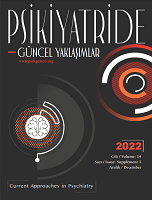The Role of Childhood Abuse and Psychological Symptoms in Discriminating Frequency of Drug Use and Self-Harm in Incarcerated Men Convicted of Robbery
The Role of Childhood Abuse and Psychological Symptoms in Discriminating Frequency of Drug Use and Self-Harm in Incarcerated Men Convicted of Robbery
Author(s): Aslı Burçak Taşören, İbrahim Şirin GülSubject(s): Social psychology and group interaction, Developmental Psychology, Personality Psychology, Behaviorism
Published by: Çukurova Universitesi Tip Fakultesi Psikiyatri Anabilim Dalı
Keywords: Robbery; incarceration; childhood abuse; psychological symptoms; drug use; self-harm;
Summary/Abstract: The aim of the present study was to investigate the role of prior childhood abuse and current psychological symptoms on the frequency of drug use and self-harming behavior among a group of male prisoners convicted of robbery. The sample consists of 127 men convicted of armed, aggravated, unarmed/forced robbery, who were held in Metris T-type closed penitentiary state correctional institution. History of childhood abuse was assessed with The Childhood Trauma Questionnaire (CTQ) and psychological symptoms were assessed with The Brief Symptom Inventory (BSI). Frequency of drug use was assessed with three questions and self-harm was assessed through four questions both on the self-completed demographic information form. Among 127 men recruited, history of childhood abuse and psychological symptoms provided discrimination concerning frequency of drug use and self-harm. The rate of self-harming individuals in the present study was relatively high compared to the literature. There was a significant correlation between CTQ total and subscale scores and BSI total and subscale scores, except for the emotional neglect subscale.
Journal: Psikiyatride Güncel Yaklaşımlar
- Issue Year: 14/2022
- Issue No: Suppl. 1
- Page Range: 83-91
- Page Count: 9
- Language: English

